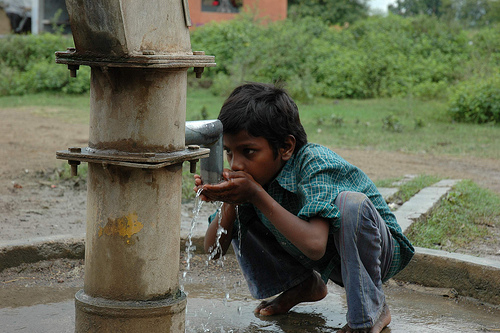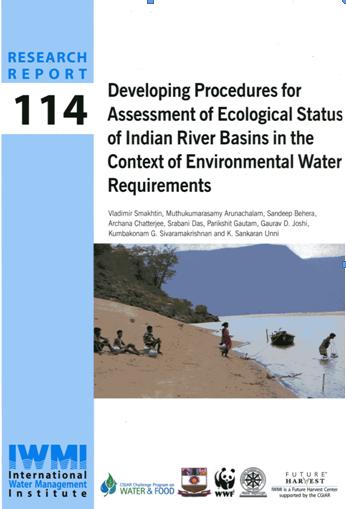India
Environmental flows A methodology of calculation for India (Part 1)
Posted on 24 Aug, 2010 10:07 AM
In order to maintain the ecological goods and services of rivers and other hydrological regimes like wetlands, lakes, etc., environmental flow allocations (eflows) are a necessity. At the same time, water demands in India are increasing and will keep increasing and solutions like waste water treatment, pollution control, correction of leakages and wastage of water, efficient irrigation systems, efficient agricultural systems, etc., will take considerable time to evolve, even with our best efforts. So what should we do in the meantime? There are vulnerable ecological systems on the verge of collapse..How do we respond to these challenges?
Pumping tests on wells: A means of measuring the storage and transmission properties of aquifers
Posted on 24 Aug, 2010 10:03 AMThe presentation by ACWADAM is part of the training module developed by them on “Planning, development and management of groundwater with special reference to watershed management programmes”. Pumping a well and observing the effect of such pumping on the water level in the pumped well as well as in the adjoining parts of the aquifer through observation wells is the basic procedure involved in a pumping test.
Drop shot - Photo contest brought to you by Schools Water Portal
Posted on 23 Aug, 2010 05:38 PM
The Schools Water Portal is a section under the India Water Portal, an open, inclusive, web-based platform, for sharing water management knowledge amongst practitioners and the general public. It is a voluntary effort co-ordinated by Arghyam, a non-profit trust set up with a personal endowment from Ms. Rohini Nilekani, which works in the area of water.
The Schools Water Portal is organizing "Drop Shot - Photo Contest" for all the students above VIII std to XII std and the undergraduates (2 categories).
Converting rain into grain: Opportunities for realizing the potential of rainfed agriculture in India - A working paper by the Challenge Programme on Water and Food
Posted on 22 Aug, 2010 10:41 PMThe study was done under the "Strategic Analyses of India’s National River Linking Project", of the Challenge Programme on Water and Food (CPWF) to estimate the available runoff in the potential regions to mitigate the terminal drought in the dominant rainfed districts of India.
Energy supply and the expansion of groundwater irrigation in the Indus-Ganges Basin - A working paper by Challenge Program on Water and Food
Posted on 22 Aug, 2010 08:27 PMThe paper by International Water Management Institute (IWMI), Challenge Programme for Water and Food (CPWF) and University of Arizona deals with energy supply and expansion of groundwater irrigation in the Indus-Ganges basin. Irrigation using groundwater has expanded rapidly in South Asia since the inception of the Green Revolution in the 1970s and it represents the largest source of irrigation in the basin.
India Water Portal is looking for Content Editors
Posted on 21 Aug, 2010 07:27 PMThe India Water Portal is an open, collaborative, web-based initiative, anchored by Arghyam, for sharing water management knowledge amongst practitioners, experts and the general public. Through its content and services, the portal aims to inspire, catalyse and support water/environment development initiatives on the ground, across the country.
Water Jobs via DevNetJobsIndia.org dated August 19, 2010
Posted on 19 Aug, 2010 11:54 AMContent Courtesy: DevNetJobsIndia
- Watershed Engineer
Foundation for Development Research & Action (FDRA)
Location: Shivpuri and Murena
Last Date: August 30, 2010
Impact of climate change on water resources and glacier melt and potential adaptations for Indian agriculture - A working paper by Challenge Program on Water and Food
Posted on 17 Aug, 2010 11:24 PMThe paper by the Challenge Program on Water and Food deals with the impact of climate change on water resources & glacier melt and potential adaptations in Indian agriculture. Global climatic changes will have major effects on precipitation, water availability, glacier/ice melt, and sea level rise. Climate-induced changes in hydrological conditions will affect the magnitude, frequency, and damage costs of future extreme events.
Water-use accounts in basins: Model concepts and description – A working paper by the Challenge Program on Water and Food
Posted on 16 Aug, 2010 12:18 PMThis paper deals with basin water use accounting and is a contribution to the synthesis work of the CGIAR Challenge Program on Water and Food's (CPWF) Basin Focal Projects. It provides a means to assess the interactions between water, food, poverty, and the environment and helps develop sound information about water availability in a basin, where it goes and how it is used.
UN General Assembly s resolution on water and sanitation as a human right
Posted on 13 Aug, 2010 05:00 PMThe recent UN General Assembly Resolution on declaring water and sanitation as human right is or can be a powerful impetus to securing universal access to water and sanitation for people everywhere. This is the most recent in a string of initiatives to advance the provision of these essential services. Beginning with the UN Decade of Water in the eighties, then the declaration of the Millennium Development Goals, and later the adoption of General Statement 15 by the Economic and Social Council of the United Nations in 2002 the recognition of the fundamental importance of water (and more recently sanitation) to life, health and well being has been accepted at the international level. In India, while there is no specific mention of the right to water in the Constitution, the Supreme Court in its judgement(s)has upheld this as part of the right to life. Some organizations are working to make this a fundamental right, to remove any ambiguity.

Boy drinking water from handpump in Guna, Madhya Pradesh - Handpumps and wells are still one of the major source of drinking water in India.
Photo credits: Anil Gulati
